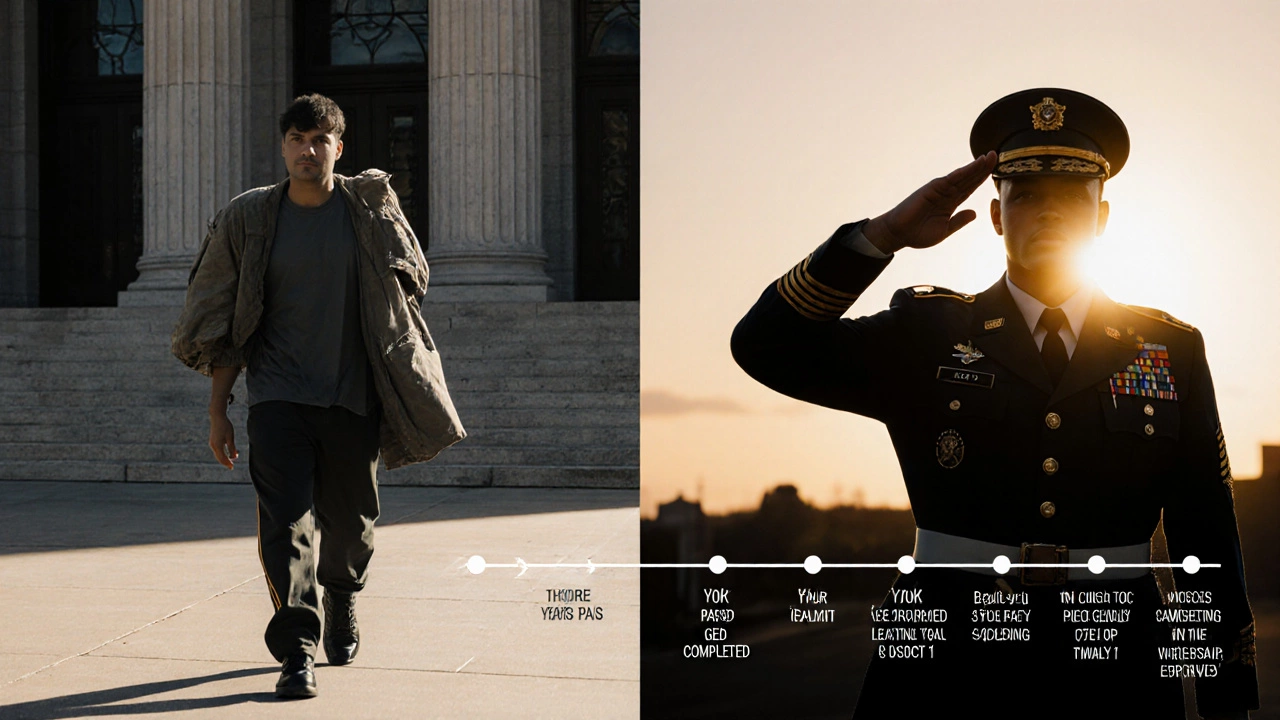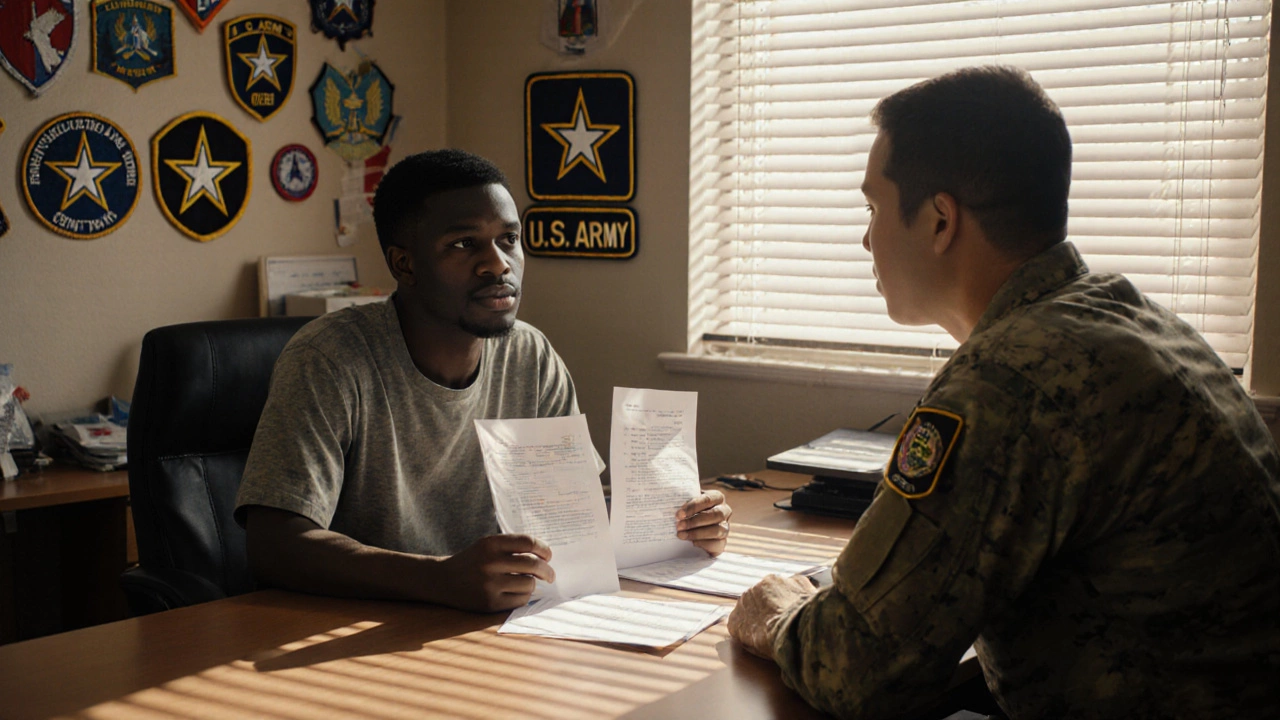Military Felony Waiver Eligibility Calculator
Your Details
Answer accurately to get your eligibility assessment
Branch Preference
Select your target branch
Enter your details and click Calculate to see your eligibility
Thousands of people with criminal records wonder if they can still serve in the military. The short answer: yes, but it’s not easy. The U.S. military doesn’t automatically bar felons from enlisting-but it doesn’t make it simple either. Your chances depend on the type of crime, when it happened, your rehabilitation, and whether the branch will grant you a waiver. This isn’t a guess. It’s a process with real rules, and knowing them can change your path.
What Counts as a Felony for Military Purposes?
The military defines a felony as any crime punishable by more than one year in prison. That includes violent crimes like assault, robbery, or burglary. But it also covers non-violent offenses like drug trafficking, fraud, or even some DUIs if they involved injury or multiple offenses. Not all felonies are treated the same. A single non-violent drug possession charge from five years ago is viewed differently than a conviction for armed robbery.
The military uses the Manual for Courts-Martial and Department of Defense Directive 1332.14 to classify offenses. They don’t just look at the label-you’re evaluated by the nature of the act, your age at the time, and how many times you’ve been in trouble. A person with three misdemeanor theft charges might be seen as higher risk than someone with one non-violent felony.
Branch Differences: Army, Navy, Air Force, Marines, Coast Guard
Each branch has its own standards. The Army is the most likely to grant waivers for felony convictions. The Marine Corps is the strictest. The Navy and Air Force fall in between. The Coast Guard rarely accepts applicants with any felony record, even if it’s old.
For example, in 2024, the Army granted over 1,200 moral waiver approvals for felony convictions. The Navy approved about 300. The Air Force approved fewer than 100. The Marines approved fewer than 20. These numbers aren’t publicized, but they’re confirmed by military recruiters and veteran advocates who track waiver trends.
If you’re serious about joining, start with the Army. They have the most established waiver system and the highest approval rates. But don’t assume you’ll be accepted just because you picked the "easiest" branch. You still need to prove you’ve changed.
What Makes a Felon Eligible for a Waiver?
There’s no checklist that says, "If you did X, you get approved." But recruiters and waiver boards look for patterns. Here’s what works:
- Time passed: At least three years since your last arrest, conviction, or completion of probation. Five years is better.
- No repeat offenses: One felony? Possible. Two or more? Extremely unlikely.
- Non-violent crime: Property crimes, drug possession, or fraud are more likely to be waived than assault, sexual offenses, or weapons charges.
- Rehabilitation proof: College courses, steady employment, volunteer work, counseling records, letters from employers or community leaders.
- Education and ASVAB score: A high school diploma and an ASVAB score in the 50th percentile or higher significantly improve your odds.
One veteran with a 2018 felony for possession of a controlled substance got approved in 2023 after completing a GED, working full-time for four years, and getting letters from his employer and parole officer. He didn’t get into the Marines-but he’s now serving in the Army National Guard.

What Automatically Disqualifies You?
Some offenses are outright banned. No waivers. Ever.
- Sexual assault or any crime involving minors
- Multiple DUIs or DWIs
- Any conviction for arson, terrorism, or espionage
- Being on probation or parole at the time of application
- Any felony conviction within the last three years
Even if your conviction is old, if it involved violence or drugs with intent to distribute, your chances drop dramatically. The military doesn’t just care about legality-they care about trust. A person who’s shown they can’t follow the law once is seen as a risk to unit cohesion and security clearance.
The Waiver Process: How It Actually Works
You don’t apply for a waiver online. You don’t fill out a form and wait. It’s a manual review that starts with your recruiter.
- Disclose your record upfront. Lying will get you discharged later-even if you make it in.
- Your recruiter submits your file to the waiver authority (usually a senior officer in your branch’s recruiting command).
- They request your full criminal record from the FBI and state databases.
- They review your application, ASVAB score, education, employment history, and character references.
- A decision is made within 30 to 90 days. You’ll be notified by your recruiter.
If denied, you can reapply after six months-but only if your situation has changed. Getting a college degree, completing substance abuse treatment, or holding a job for two years can strengthen your next application.
Can You Get a Security Clearance With a Felony?
Even if you get in, not every job is open to you. Jobs requiring top-secret clearance are almost always off-limits to anyone with a felony record. But many roles don’t need high-level clearance: infantry, mechanics, logistics, culinary, and IT support roles often only require a general background check.
For example, an Army medic with a past felony for possession might be cleared for field medical duties but denied a role in military intelligence. The military evaluates each job’s sensitivity separately. Your felony doesn’t lock you out of the military-it just limits your options.

What Happens If You Lie?
People think they can hide a felony. They can’t. The military runs a full FBI background check. It’s not a formality-it’s a deep dive into every arrest, charge, and court appearance.
If you lie and get in, you’ll be discharged under “fraudulent enlistment.” That’s not an honorable discharge. It’s a bad one. It blocks VA benefits, future federal jobs, and even some state licenses. You lose everything you fought for.
Honesty isn’t just ethical-it’s your only real shot.
Alternatives If You Can’t Join
If the military says no, that doesn’t mean your service is over. The U.S. government hires people with criminal records for many roles:
- Correctional officers in federal prisons (BOP hires with felonies after 7 years)
- Firefighters in some states (varies by location, but many waive non-violent records)
- Postal workers (USPS has a history of hiring people with records)
- Public works and maintenance jobs with city or county governments
Some of these jobs even offer tuition assistance, pensions, and paths to advancement. They’re not the same as military service-but they’re still public service.
Final Reality Check
Can a felon join the military? Yes-for some people, under strict conditions. But it’s not a backup plan. It’s a second chance you have to earn. If you’re willing to wait, prove yourself, and accept limitations, it’s possible. If you want a quick fix or think the military will overlook your record? You’re setting yourself up for disappointment.
Start by talking to a recruiter-honestly. Bring your records, your resume, and your story. Don’t ask if you can join. Ask how you can qualify. The answer might not be yes today. But with time and effort, it could be yes tomorrow.
Can I join the military if I have a felony on my record?
Yes, but only if the offense qualifies for a waiver. Non-violent felonies older than three years have the best chance. Violent crimes, sexual offenses, or recent convictions usually disqualify you. The Army has the highest waiver approval rates, while the Marine Corps and Coast Guard rarely accept applicants with felonies.
How long do I have to wait after a felony to join the military?
You typically need at least three years since your last arrest, conviction, or end of probation. Five years is strongly preferred. The longer the time passed, the better your chances-especially if you’ve stayed out of trouble, worked steadily, and improved yourself during that time.
Do all branches of the military accept felons?
No. The Army approves the most waivers, followed by the Navy and Air Force. The Marine Corps and Coast Guard rarely accept applicants with felony records. Each branch sets its own standards, and waivers are granted on a case-by-case basis.
Can I get a security clearance with a felony conviction?
Almost never. Jobs requiring top-secret or sensitive clearances are off-limits to anyone with a felony record. However, many military jobs don’t require high-level clearance-like mechanics, cooks, or logistics specialists. Your options will be limited, but not eliminated.
What happens if I lie about my criminal record on my application?
If you lie and get in, you’ll be discharged for fraudulent enlistment. This is a punitive discharge that blocks VA benefits, federal employment, and many state licenses. The military runs a full FBI background check-there’s no way to hide a felony. Honesty is your only path to enlistment.
Are there government jobs for felons if I can’t join the military?
Yes. The U.S. Postal Service, federal prison system (BOP), and many city and county public works departments hire people with criminal records. These jobs often offer benefits, pensions, and advancement opportunities. While not military service, they’re still public service roles with stability and purpose.
